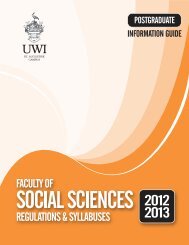Faculty of Humanities and Education (Postgraduate) - The University ...
Faculty of Humanities and Education (Postgraduate) - The University ...
Faculty of Humanities and Education (Postgraduate) - The University ...
Create successful ePaper yourself
Turn your PDF publications into a flip-book with our unique Google optimized e-Paper software.
74<br />
POSTGRADUATE REGULATIONS & SYLLABUSES 2012 - 2013<br />
THE FACULTY OF HUMANITIES & EDUCATION<br />
2. Social <strong>and</strong> Affective Factors Influencing Learning<br />
• Motivation <strong>and</strong> learning: Intrinsic <strong>and</strong> extrinsic<br />
rewards, the teacher’s motivation tasks, cooperation<br />
<strong>and</strong> competition, increasing achievement motivation<br />
• Classroom social climate: Teacher behaviours,<br />
classroom group processes<br />
• Self-concept: Academic self-concept, anxiety<br />
3. Managing the Learning Environment<br />
• Role <strong>of</strong> the teacher: Classroom manager, authority<br />
figure, socializing agent<br />
• Establishing <strong>and</strong> maintaining the learning<br />
environment: <strong>The</strong> physical environment, group<br />
leadership, group management techniques<br />
• Behaviourmanagement:Problembehaviour,discipline<br />
<strong>and</strong> punishment, conflict resolution, behaviour<br />
modification, mechanisms <strong>of</strong> escape <strong>and</strong> defence.<br />
REFERENCES<br />
Eggen, P., & Kauchak, D. (2004). <strong>Education</strong>al psychology: Windows<br />
on classrooms (6th ed.) Upper Saddle Rivers, NJ: Prentice<br />
Hall.<br />
Gage, N. L., & Berlinger, D. C. (1992). Psychology for teachers (5th<br />
ed.). Boston, MA: Houghton Mifflin Co.<br />
C. Sociology <strong>of</strong> <strong>Education</strong><br />
Rationale<br />
This unit is intended to provide the student with the concepts<br />
<strong>and</strong> tools <strong>of</strong> analysis to underst<strong>and</strong> the relationship between the<br />
school <strong>and</strong> society, <strong>and</strong> how this relationship affects individuals<br />
<strong>and</strong> groups within the educational system.<br />
OBJECTIVES<br />
Teachers will develop an underst<strong>and</strong>ing <strong>of</strong>:<br />
1. the relationship between the school <strong>and</strong> the society in<br />
which it operates;<br />
2. the influence <strong>of</strong> the family on educational achievement;<br />
3. the effects <strong>of</strong> peer groups on the development <strong>of</strong> the<br />
individual;<br />
4. <strong>The</strong> ways in which the school as a social organization can<br />
influence academic performance <strong>and</strong> learning <strong>of</strong> norms.<br />
CONTENT<br />
1. <strong>Education</strong> <strong>and</strong> Society<br />
This module will examine the relationship between<br />
education <strong>and</strong> society. Students will be introduced to the<br />
theoretical perspectives used by sociologists to examine<br />
social phenomena; the purposes <strong>of</strong> schooling will be<br />
discussed, e.g., socialization, certification, preparation<br />
for the labour market; social transmission <strong>and</strong> social<br />
transformation models <strong>of</strong> schooling <strong>and</strong> the relationship<br />
between school <strong>and</strong> work.<br />
2. Into the Classroom<br />
In this module, students will move from the macro<br />
perspectives into the micro, focusing on the internal<br />
processes <strong>of</strong> schools such as classroom interaction, teacher/<br />
student relationships, teachers’ perceptions <strong>of</strong> teaching,<br />
their role, pr<strong>of</strong>essional development, <strong>and</strong> the issue <strong>of</strong><br />
curriculum/school knowledge <strong>and</strong> what counts or is valued<br />
as worthwhile knowledge in schools.<br />
3. Equality <strong>of</strong> <strong>Education</strong>al Opportunity<br />
This module will examine the concept <strong>of</strong> equality <strong>of</strong><br />
educational opportunity <strong>and</strong> examine the various factors<br />
that influence educational opportunity, e.g.<br />
• socialclass<strong>and</strong>itsrelationshiptoeducationalprovision<br />
<strong>and</strong> achievement<br />
• gender<br />
• ethnicity<br />
• education in the Third World <strong>and</strong> its relationship to<br />
development theories.<br />
REFERENCES<br />
Freire, P. (1994). Pedagogy <strong>of</strong> hope. New York: Continuum Pub.<br />
Co.<br />
Mulkey, L. M. (1993). Sociology <strong>of</strong> education: <strong>The</strong>oretical <strong>and</strong><br />
empirical investigations. NewYork: Holt, Rinehart &<br />
Winston.<br />
Robinson, P. (1981). Perspectives on the sociology <strong>of</strong> education:<br />
An introduction. London: Routledge & Kegan Paul.<br />
D. Language in <strong>Education</strong><br />
Rationale<br />
Language is the most unique <strong>of</strong> all human attributes. It is a<br />
means <strong>of</strong> human communication <strong>and</strong>, at the same time, a mode<br />
<strong>of</strong> thought <strong>and</strong> learning through which reality is constructed<br />
<strong>and</strong> presented. Firstly, through its communicative potential,<br />
language makes available to others thoughts, ideas, <strong>and</strong><br />
feelings. This aspect makes it a vital part <strong>of</strong> human learning,<br />
central to the interaction between teacher <strong>and</strong> pupil. Secondly,<br />
language <strong>of</strong>fers the means <strong>of</strong> bringing knowledge into being,<br />
making it personal, through the active shaping <strong>and</strong> interpretive<br />
processes <strong>of</strong> speaking, writing, listening, <strong>and</strong> reading. It enters<br />
the curriculum, therefore, both as a communication system <strong>and</strong><br />
as a means <strong>of</strong> learning.<br />
OBJECTIVES<br />
Teachers will:<br />
1. underst<strong>and</strong> the role <strong>of</strong> language in schools <strong>and</strong> classrooms<br />
for both teaching <strong>and</strong> learning;<br />
2. be conscious <strong>of</strong> the linguistic processes by which students<br />
meet the urgent dem<strong>and</strong>s for practical mastery <strong>of</strong> language<br />
in the various curriculum areas;<br />
3. be introduced to appropriate strategies <strong>and</strong> resources<br />
to help students meet the urgent dem<strong>and</strong>s for practical<br />
mastery <strong>of</strong> language in the various curriculum areas;<br />
4. develop the skills to evaluate students’ language abilities<br />
<strong>and</strong> devise ways <strong>of</strong> extending them;

















